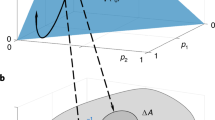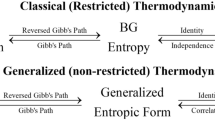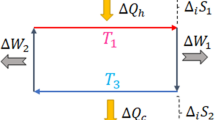Abstract
THIS communication gives a simple deduction of Carathéodory's principle from Kelvin's principle that it is impossible to convert an amount of heat completely into work in a cyclic process without at the same time producing other changes. There has always been some difficulty in motivating Carathéodory's principle convincingly1. The present argument demonstrates for the first time that this principle can be obtained directly and simply from the impossibility of a perpetuum mobile of the second kind, and some reappraisal of the relationship between these two methods of developing thermodynamics appears, therefore, to be required.
This is a preview of subscription content, access via your institution
Access options
Subscribe to this journal
Receive 51 print issues and online access
$199.00 per year
only $3.90 per issue
Buy this article
- Purchase on Springer Link
- Instant access to full article PDF
Prices may be subject to local taxes which are calculated during checkout
Similar content being viewed by others
References
Born, M., Natural Philosophy of Cause and Chance, 39 (Oxf. Univ. Press, 1949). Landsberg, P. T., Thermodynamics with Quantum Statistical Illustrations, 53, 61 (Interscience, 1961).
Planck, M., S.B. preuss. Akad. Wiss., 453 (1926).
Author information
Authors and Affiliations
Rights and permissions
About this article
Cite this article
LANDSBERG, P. A Deduction of Carathéodory's Principle from Kelvin's Principle. Nature 201, 485–486 (1964). https://doi.org/10.1038/201485b0
Issue Date:
DOI: https://doi.org/10.1038/201485b0
This article is cited by
-
Joule’s Experiment as an Event Triggering a Formalization of a Baconian Science Till Up to an Alternative Theory to Newton’s One
Foundations of Science (2021)
-
Thermodynamics of non-differentiable systems
International Journal of Theoretical Physics (1974)
-
Connections between the various forms of the second law of thermodynamics
Il Nuovo Cimento B Series 10 (1969)
-
Carathéodory's Principle and the Kelvin Statement of the Second Law
Nature (1965)
Comments
By submitting a comment you agree to abide by our Terms and Community Guidelines. If you find something abusive or that does not comply with our terms or guidelines please flag it as inappropriate.



